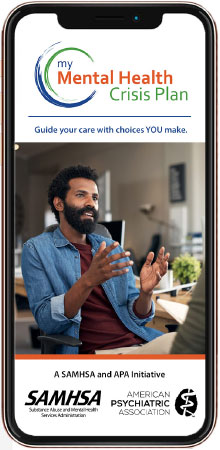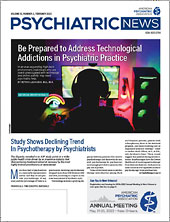There is increasing interest in helping individuals with serious mental illness (SMI) create a crisis plan: As of press time, My Mental Health Crisis Plan app has been downloaded more than 7,625 times and just racked up its second award, “Best Health Care Mobile Application” for 2021 in the MobileWebAwards.
“When a crisis occurs, some people with mental illness lose control of their treatment and their treatment choices. Due to an inability to make and communicate treatment decisions, they are unable to give valid, informed consent to a treatment plan,” said Marvin Swartz, M.D., professor and head of the Division of Social and Community Psychiatry at the Duke University School of Medicine, who consulted on the app’s design. “The default may be involuntary commitment, which many patients later regret. Such patients may not have their choice of hospital, and they are most often transported by police, which can give them the feeling of being arrested. It’s an intimidating process.”
The app was developed and released in October 2020 by SMI Adviser, which is funded by the Substance Abuse and Mental Health Services Administration and administered by APA. SMI Adviser provides a variety of free resources and consultations with clinical experts to provide the best possible care for people with serious mental illness.
The My Mental Health Crisis Plan app walks people through the process of creating a crisis plan by letting them specify their preferences for facilities, emergency treatments, clinicians, and medications.
Individuals who create a crisis plan using the app can also list the names of their proxy (decision-maker); psychiatrist, therapist, and other clinicians; emergency contacts and others to be notified; and whom they prefer to watch their children.
My Mental Health Crisis Plan allows individuals to easily share their crisis plan via text, email, PDF, or even QR code—the app also won an award in 2020 for best use of a QR code. “For privacy reasons, none of the data that someone inputs is stored to the cloud; it is saved only on the user’s phone,” explained Amy Cohen, Ph.D., director of SMI Adviser. “Ultimately, the goal is the advancement of patient-centered care by ensuring that an individual’s voice is heard, even during times when the individual may not be able to clearly express his or her wishes,” she said.
The app also helps users take a few extra steps to turn their crisis plan into a psychiatric advance directive (PAD), a legal instrument that allows individuals to plan for their own care in the event of decisional incapacity. According to the National Resource Center on Psychiatric Advance Directives, at least 27 states have adopted statutes specifically authorizing PADs in the past decade.
“We recommend them for people who have had psychotic episodes or periods of incoherence from which they’ve recovered. That can be someone with schizophrenia, bipolar disorder, or some other crisis during which they cannot make treatment decisions,” Swartz said. Many clinicians have the misperception that patients with schizophrenia and other psychotic disorders lack sufficient insight about their disorder to complete a plan, he added. Landmark research reported in 2006 by Jeffrey W. Swanson, Ph.D., Swartz, and colleagues in the American Journal of Psychiatry refuted this: While only 3% of participants with severe mental illness given information about PADs completed one, among those given assistance, 61% of participants did so, he said.
Some states require extra steps for PADs to become legally binding, such as having it witnessed or notarized. My Mental Health Crisis Plan informs users of the specific steps needed in their state. Even for patients who don’t wish to take those final extra steps, just developing a crisis plan is very powerful, Cohen said. “It is good for the therapeutic alliance. You and your clinician are sitting down and talking about potential warning signs that things are not going well, as well as the key things that help you recover.”
Cohen added, “We envision these being set up when individuals are being discharged from the hospital or for [Assertive Community Treatment] teams to use with their patients.” Psychiatrists are in a unique position to advise their patients with a history of these types of crises about the important role of PADs in their treatment plan.
“It would have a big impact if psychiatrists introduced the idea of a psychiatric advance directive with their patients,” she said. “They’re often the most powerful voices in the care of these individuals and could really move the needle on getting more of these set up.” ■
The app can be downloaded at the SMI Adviser’s website at
smiadviser.org.
“Facilitated Psychiatric Advance Directives: A Randomized Trial of an Intervention to Foster Advance Treatment Planning Among Persons With Severe Mental Illness” is posted
here.

